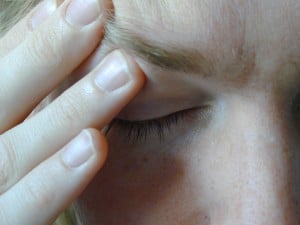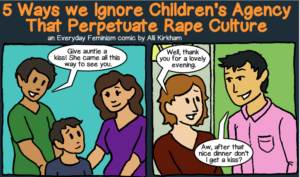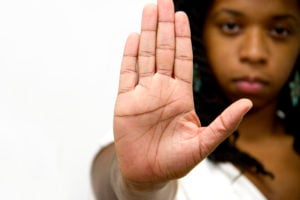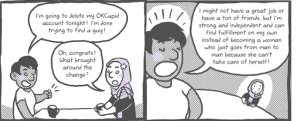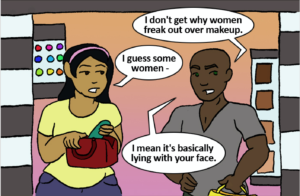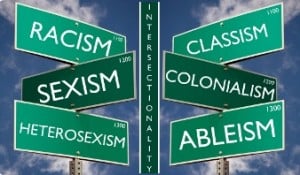Today, I want to talk about race. And I know that I’ve been on hiatus, and I promised you all on Twitter that I would make a video about diet culture, and I am. I am going to make that video. But I’m a little concerned about how many YouTubers are just going about their lives making videos and not addressing race, in general, but especially now.
So, I want to talk about race. I want to do that through a body image, feminist lens, since if you watch my channel, that’s what you expect from me. And I specifically want to talk about the idea that race is a construct, and therefore, doesn’t matter because – spoiler alert – that’s bullshit.
So let’s talk about bodies for a second. More specifically, let’s talk about our bodied experience, which is a phrase that describes the relationship that we have psychologically or emotionally or spiritually with our encasement, which is a huge component of body image.
In body image discourse, we talk a lot about the fact that we are not our bodies. That our personhood and our outside appearances aren’t really related.
Generally, in these conversations, what we’re pushing is the notion that what’s inside counts more than what’s outside. Duh. You learn that when you’re like five. But within the body image and body positive community, we also have to have conversations around the fact that, yeah, obviously that’s true, but the way that our physical selves exist in the world matters. It matters because it causes reactions both inside and outside of ourselves.
So no amount of telling someone that it’s what’s on the inside that counts is going to stop an eating disorder, for example, nor is it going to make fatphobia disappear. It’s true, but we’re lying to ourselves if we think that the world has caught up with that. The world has not caught up with that.
When you walk into a room, people make judgments based on what they see. If they like what they see, then you get one kind of attention. If they don’t like what they see, then you get another kind of attention.
If you’ve ever seen a jealous woman sneer at a skinny girl who walks in or if you’ve ever seen people make disgusted faces at fat folks when they’re eating or if you’re uncool like me and you don’t know how to dress and you are ridiculed all through middle school, then you know what I’m talking about. That idea – that social messages are attached to your body – can and need to be applied to race.
So, when people refer to social constructs, what they’re talking about are ideas that were created. They’re not really hard facts; rather, they’re values or norms that, as a society, we decided on. Social constructs can change. For example, there was a time when thicker, lusher, fatter bodies were held as the ideal because in a time of disease and starvation, they were harder to attain and maintain.
Now, thinner bodies are held as the ideal because in a culture of bounty and consumption, they are harder to attain and maintain. The social constructs of attractiveness and health changed.
Race, in a way, is a social construct because we, as a society, applied meaning to it. Obviously skin color isn’t a social construct. That’s a thing, but the values that we hold around skin color, we just made up. We just made them up. But just because we made them up doesn’t mean that they don’t have real effects on people’s lives.
Just like your body type is ascribed assumed characteristics, whether or not they’re accurate, so is the color of your skin. People see the color of your skin the same way that they take in the whole of your body when they look at it and they decide, “Oh, this person must be like this, this, this, and this. This person’s life must be like this, this, this, this, and this.” This affects the way that people are treated.
This is not a conspiracy theory. This is not me suggesting that there is a board room with a big banner that says “White Supremacy” where people just sit around and decide how to keep people of color from gaining justice and equity – although, I don’t know, sometimes I wonder. This is just fact.
This is sociological, psychological fact that 1) we ascribe meaning to physical characteristics like race, that 2) we judge people positively or negatively based on those assumptions, and that 3) we act accordingly. And it is deeply embedded in our consciousness to the point that it’s subconscious. Talk to Freud about that shit. I’m just kidding. He’s dead.
Should it be that way? Fuck no. But it is, and that’s not okay. But you want to know what else isn’t okay? When we just pretend that that’s not how things are. When we say that we “don’t see color” because that somehow makes us not racist. We’re all racist. You, me, everyone that we know. Racist.
Because we hold these subconscious beliefs about people because that’s what we’ve been taught, both implicitly and explicitly, our entire lives. When you ignore or deny that fact, you’re not being not racist. You’re actually being what we call complicit in racism, which means unwittingly supporting white supremacy. And you don’t want to do that. Don’t do that.
One way to start unlearning that shit is to say, “Yeah, I do see race. I do see how race affects people’s lived experiences. I do understand that racism isn’t always explicit, but that it’s racism just the same. I do think that that’s fucked up, and I want to fix it because, yeah, race matters.”
If you can’t look around you and see how desperately, desperately race plays a role in the way that people experience their bodies and the bodies of others, if you’re the kind of person who says, “Why do they have to make it a race thing,” then you are part of the problem.
Race is a thing. It effects people’s lives, social construct or not, but because it’s a social construct, the ideas that we have around race can change. So instead of vehemently denying the fact that race is an important component of our existences, go out and change it.






